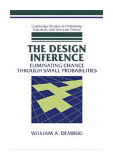Steve Cable continues his analysis of Probe’s 2020 survey of American religious views moving over to consider their response...
Tag Archive for: science
Michael, thank you so very much for your insightful articles about Reiki. My father was an excellent medical doctor...
Appendix A: Theology vs. Science or Theology plus Science? Note: This is one of two appendices for Steve Cable’s...
Dr. Ray Bohlin comments on the hubris of Drs. Coyne and Cobb in their op-ed in Nature, in which...
When you suddenly learn you might have only 18 months to live, its a good time to sort out...
A fellow Christian friend and I recently got into a discussion over faith and facts, and I would like...
The skepticism and relativism seen in our society today didn’t just pop up out of nowhere. They received new...
Although much has occurred in this field since this article was written in 2000, the questions addressed by Dr....
The Design Inference True scientific revolutions that impact more than a single discipline rarely occur more than once a...
Has Oz Returned to Kansas? Suddenly, the mere mention of the Kansas State Board of Education in most educational...
Our Topics
- Reasons to Believe
- Probe Answers E-Mail
- Reasons to Believe/Apologetics Emails
- Angels/Demons Emails
- Bible Emails
- Christian Life Emails
- Cults/World Religions Emails
- Education Emails
- Gender Issues Emails
- Homosexuality Emails
- Marriage/Family Emails
- Origins/Science Emails
- Personal Development/Relationships Emails
- Sexuality Emails
- Society/Culture Emails
- Theology Emails
- Philosophy Emails
- Cults and World Religions
- Current Issues
- Culture and Society
- Politics and Faith
- Science and Faith
- Marriage, Sexuality & Identity
- History, Holidays & Quizzes
- Theology and Philosophy
- Founder’s Corner






